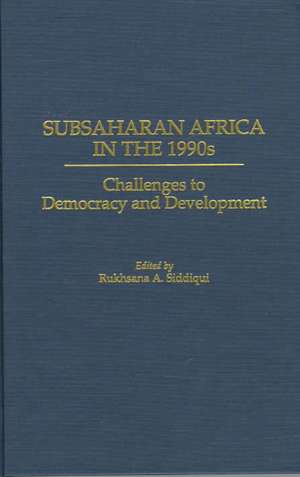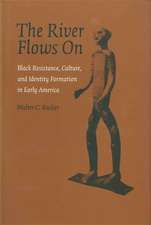Subsaharan Africa in the 1990s: Challenges to Democracy and Development
Autor Rukhsana A. Siddiquien Limba Engleză Hardback – 24 iun 1997 – vârsta până la 17 ani
Preț: 436.99 lei
Preț vechi: 707.30 lei
-38% Nou
Puncte Express: 655
Preț estimativ în valută:
83.62€ • 87.52$ • 69.60£
83.62€ • 87.52$ • 69.60£
Carte tipărită la comandă
Livrare economică 31 martie-14 aprilie
Preluare comenzi: 021 569.72.76
Specificații
ISBN-13: 9780275951429
ISBN-10: 0275951421
Pagini: 240
Dimensiuni: 156 x 235 x 23 mm
Greutate: 0.48 kg
Ediția:New.
Editura: Bloomsbury Publishing
Colecția Praeger
Locul publicării:New York, United States
ISBN-10: 0275951421
Pagini: 240
Dimensiuni: 156 x 235 x 23 mm
Greutate: 0.48 kg
Ediția:New.
Editura: Bloomsbury Publishing
Colecția Praeger
Locul publicării:New York, United States
Notă biografică
RUKHSANA A. SIDDIQUI is Associate Professor at Quaid-i-Azam University in Pakistan. She holds a doctorate from the University of Pennsylvania, and has held teaching and research positions at Yale University, University of Dar-es-Salaam, and Bilkent University. Her books include Subsaharan Africa: A Subcontinent in Transition (1993) and Ideology and Socialist Transition in Tanzania (1988). She publishes in Annals of the American Academy of Political Science, Review of African Political Economy, and Canadian Journal of Peace Research.
Cuprins
AcknowledgmentsIntroductionCivil Society and Democratic TransitionCivil Society and Democratic Consolidation: Building a Culture of Democracy in a New South Africa by Larry DiamondThe "New" Civil Society and Democratic Transitions in Africa by Edward R. MacMahonLessons to Be Learned from the Angolan Elections: 38 Reliable Guides or Misleading Judgments by William MinterThe Politics of Economic ReformsLabor, Structural Adjustment, and Democracy in Sierra Leone and Ghana by Alfred B. Zack-WilliamsPrivatization in a Transitional Society: A Kenyan Case Study by Rukhsana A. Siddiqui"The End of History or the Beginning of the End?": Prospects for Botswana in the Twenty-First Century by Larry A. SwatuckThe Problems of Development ManagementNongovernmental Organizations and Government-Organized Nongovernmental Organizations: Opportunities for Development Management in Africa in the Twenty-First Century by Peter Koehn and Olatunde Ojo"Managing" Development in Subsaharan Africa in the 1990s: States, Markets, and Civil Societies in Alternative Paradigms by Sandra MacleanWomen and Empowerment in Africa in the 1990sToward Equality for All?: International Human Rights for African Women by Lynn BeratBarriers and Opportunities: The Role of Organizations in Nigerian Women's Quest for Empowerment by Mary J. OsirimToward the Sustainable Development of African Ecology and EnvironmentAfrica's Environmental Challenges: Deforestation and Development by Moses K. TesiThe Issues of Development and Environment in Africa: An Overview by E. Ike UdoguBibliographyIndexAbout the Contributors












